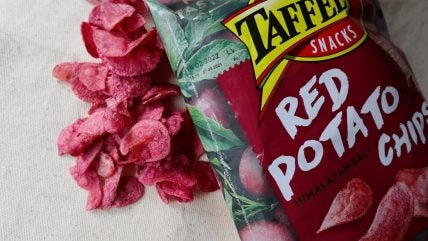
Norwegian food-to-hydro conglomerate Orkla is prepared to hike prices this year if raw material costs continue to rise.
Report its 2023 financial results, the Oslo-based group said it expected to see continued high prices for cocoa, fish-oils and tomato ingredients this year.

Discover B2B Marketing That Performs
Combine business intelligence and editorial excellence to reach engaged professionals across 36 leading media platforms.
Orkla also predicted to see easing costs for sugar and grain-based ingredients.
Speaking to analysts during the company’s fourth-quarter results call, CEO Nils Selte said: “We always negotiate with our customers and we will increase prices if necessary for the period to come as well when we see price increases on the raw materials.”
Orkla’s operating revenue rose 16% in 2023 to Nkr67.8bn ($6.45bn).
However, operating profit decreased 9.6% to Nkr6.2bn. Adjusted EBIT was down 6.6% at Nkr6.9bn.

US Tariffs are shifting - will you react or anticipate?
Don’t let policy changes catch you off guard. Stay proactive with real-time data and expert analysis.
By GlobalDataFourth-quarter revenue was up 10.3%, influenced “by positive currency translation effects and organic sales growth for the consolidated portfolio companies as a result of price increases”.
While Orkla acknowledged that the pressure from cost inflation was not fully out of sight, it remained somewhat optimistic about future raw material prices.
During the earnings call, CFO, Harald Ullevoldsæter, said: “Input costs still pose a challenge but the situation is showing signs of stabilising.”
The private-label effect
The group’s food brands division, Orkla Foods Europe (OFE), recorded “broad-based organic sales growth driven by price increases”, in the fourth quarter, growing by 5.1%. Volume/mix however, fell 3.8%.
During 2023 as a whole, the division’s volume/mix dropped 5.8% amid consumer demand for private label goods in Sweden, Finland and Denmark. Without providing figures, Orkla said of OFE’s fourth-quarter performance: “Market share performance in grocery was in general somewhat better than previous quarters.”
Volumes sold to OFE’s out-of-home customers were “somewhat weaker” than in previous quarters, although its “sales development” in the channel “remained positive”.
Part of Orkla’s strategy to tackle increased costs and falling volumes from OFE in 2023 included restructuring the business in Czech Republic.
The company closed one factory, sold another and is in the process of assessing the status of two more. The company said it expected to decide on the remaining facilities in the first half of 2024.
Orkla’s ingredients division, Orkla Food Ingredients (OFI), saw volume/mix decline 1.8% in the fourth quarter and dip 0.4% for the full year. This came due to lower ice cream volumes in its sweet line, and its bakery unit taking a hit from high consumer demand for lower priced goods.
OFI grew operating revenues organically 1.1% in the fourth quarter of 2023, with price increases primarily driving the growth “where the impact has gradually decreased due to stablisation of raw material prices”, the company said.
Orkla sold a minority stake in the OFI business last October for Nkr15.5bn.
Responding to a question on how private label could impact Orkla’s performance in 2024, Selte said he had seen “signs of easing of competition”.
He added: “We see maybe that this shift is going back a little bit out of what we see from the [e-commerce] numbers a few days ago. And we also see signs of private label increasing prices more than actually we are doing currently.”
Repercussions of Latvia biscuit factory
Orkla’s Confectionary & Snacks division booked operating revenue of Nkr2.6bn in Q4, a 16.6% increase on the same period a year earlier. On an organic basis, sales were up 8.1%. Some 1.3% of that growth was related to higher volume/mix, Orkla said.
The segment however faced distribution challenges within its biscuits business in Sweden and the Baltics, which weighed on market share and volumes.
It also saw negative effects arising in Q4 from production challenges at its new Latvian biscuit factory. While the plant helped to boost production output in Q4, it was “still below plan on certain production lines”, said Orkla.
Fourth-quarter divisional EBIT was NKr341m, versus NKr289m a year earlier. Adjusted EBIT was NKr348m, compared to NKr345m in the final three months of 2022. “Underlying” EBIT dropped 6.9%.
Commenting on how the issues at the factory might affect Orkla’s performance in the first two quarters of 2024, Ullevoldsæter said: “You should expect that the regain will be a bit higher in the second half of 2024 but we should see improvement also in the first half.”
Orkla first announced plans to consolidate its biscuit operations in Latvia in 2018.
In a note to clients, AllianceBernstein analyst Bruno Monteyne said: “Orkla is missing expectations on all the important metrics: organic growth for Q4 was 5.3% versus consensus at 6.3% (-100 bps miss), with misses in most of the 11 divisions. Profitability is where the big misses are coming: group underlying EBIT came in at 9.1%, a 159 bps miss versus consensus at 10.7%, or NOK 1,900, a -15% miss.
“Sometimes volatile hydro power profits can cause big misses or beats but in this case the hydro power miss explains only 29% of the entire EBIT miss. It’s the underlying core business that is missing profits. The JVs (i.e. mainly Jotun) and finance costs were roughly in line, but tax was 41% better than consensus.”





